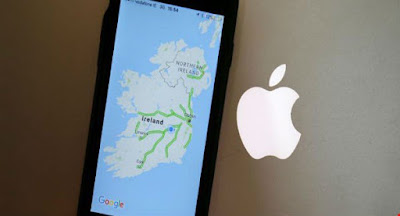Since the EU’s ruling on Apple’s €13bn in back-taxes was announced on Tuesday, the ramparts have been rushed, with all and sundry making definitive statements.
Almost immediately, Finance Minister Michael Noonan said the EU was wrong. How could he know? He might say he disputes the findings, but he made a definitive declaration without approval from cabinet.
On Wednesday, Ryanair boss, Michael O’Leary, said that the Government should tell the EU where to go.
“Frankly, the Irish Government should turn around — they shouldn’t even appeal the decision — they should just write a letter to Europe and tell them politely to fuck off,” said Mr O’Leary.
This is the same EU that facilitated the rise of Ryanair by banning State aid for faltering airlines. Like everybody else, Micko wants it both ways.
The EU itself has been all over the shop. Initially, it said the €13bn was due to the Irish Exchequer, but then claimed other countries could share in the pay-out.
In the US, the treasury department had a pop at the EU.
“We believe that retroactive tax assessments by the commission are unfair, contrary to well-established legal principles, and call into question the rules of individual member states,” it said.
Yet much of the massive global corporate tax-avoidance is engineered by American companies, facilitated by domestic laws, and enacted by American politicians who receive money from those same companies.
The high moral ground is unoccupied on this matter. On RTÉ Radio yesterday, Apple CEO Tim Cook gave an impassioned defence of his company’s tax arrangements. He might well be correct about the legal position, and genuine about Apple’s commitment to this country, and Apple might not have broken any laws, but its position on tax avoidance is morally indefensible. Apple may be getting a raw deal on this issue, but some would see it as natural justice for paying a fraction of the tax that it should.
The EU’s competition commission has adopted the stance of policeman for the citizens, ensuring that big business pays its fair share. But what cared the EU for the citizens of this country a few years ago, when it decided that the debts for much of Europe’s banking crisis be borne by us? Would the EU be as forceful if this matter involved a multinational’s relationship with France or Germany?
The ruling could be interpreted as Brussels again using a small, peripheral country as a handy experiment in forging a new path. During the recession, that path involved beating a way out of a potentially ruinous financial crisis. Today, it signals the new dispensation, under the OECD, that is determined to go after corporate tax-avoidance.
Back home, credibility is also in short supply. Successive Irish governments have bent over backwards to facilitate foreign companies using Ireland as a base for tax-avoidance. Little ruses such as the ‘double Irish’ ensured that money could be funnelled through this State, filtering out the requirements to pay tax anywhere.
In 2004, then finance minister Charlie McCreevy went one further with legislation allowing foreign companies to set up headquarters, or holding companies, here.
Thousands of brass-plate operations were opened up, facilitating major tax-avoidance in other jurisdictions. The only real benefit to this country was fat fees for a platoon of lawyers and accountants to set everything up. In recent years, the facilitation of special-purpose vehicles for vulture funds to hoover up cheap property has continued the trend.
All of this has added to the perception that Ireland is a tax haven. Technically, it might not be, but the righteous indignation from Cabinet voices about potential reputational damage from the Apple ruling rings hollow. The damage has long been done, and any appeal won’t change that. The EU may not be correct in its ruling, but Ireland has lived dangerously for a long time in facilitating tax-avoidance.
Then, the opposition are mounting their high horses. Parties such as Sinn Féin want the State to bend to the EU’s agenda this time, a complete U-turn from the party’s position when the EU was one element of the Troika. Back then, Gerry Adams told the Troika to go home.
Different position this time, same empty populism.
Anybody suggesting we should take the €13bn has another impediment en route to the high moral ground. Even if the ruling is correct, this country has no right to the money.
If it represents tax that should have been paid, then it must go to the countries in which Apple made the profits that generated the tax. If Ireland facilitated Apple in avoiding tax in other jurisdictions, it should not be rewarded for doing so with money that rightly belongs to others.
Michael Clifford


No comments:
Post a Comment